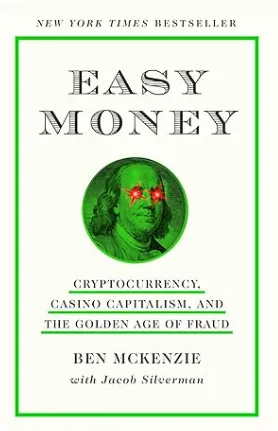Crypto book review
Paul Ashton - 6th November 2023
Easy Money: Cryptocurrency, Casino Capitalism, and the Golden Age of Fraud

I first came across Ben McKenzie’s acting career in the TV series Southland, an interesting LA Cop series that ran for 5 seasons (from 2009) with a large ensemble cast. At the start of series 1 his character is a rookie uniformed cop, getting to grips with police work in LA. The other TV role I knew him from was another cop (James Gordon) in Gotham (a Batman origin story). At the start of Gotham James Gordon is a detective, and by the end he is Commissioner Gordon, but still very much involved in the thick of the action (a far cry to the geriatric, deskbound Commissioner Gordon in the 60s TV series). Before both of these, McKenzie’s break-out role was in The O.C (a series I’ve not seen, probably because I’m far removed from its target demographic).

I first came across Ben McKenzie’s crypto-skeptic career while watching sessions from the Crypto Policy Symposium 2022. I ended up watching over half the sessions, and was surprised to see the familiar face of Ben McKenzie as a panellist (for a session called “The crypto virus: narrative economics in the golden age of fraud”). It was refreshing to see a celebrity talking sense from the basis of some knowledge of the field (McKenzie has a degree in foreign affairs and economics from the University of Virginia), something that is all too rare (in various areas, including cryptocurrency). [Aside: I ended up watching sessions from the symposium because of a post (https://davidgerard.co.uk/blockchain/2022/09/07/crypto-policy-symposium-2022-videos-are-up/) on David Gerard’s blockchain blog Attack of the 50 Foot Blockchain (https://davidgerard.co.uk/blockchain/). David’s blog is well worth signing up to. He’s direct, funny and doesn’t hold back. It’s fast paced and full of jargon, with lots of links to relevant material. Every second blog post is by fellow crytpo blogger Amy Castor (Amy and David were also Symposium panellists).]
After seeing McKenzie in action at the symposium, I was keen to read his recently-released book: Easy Money: Cryptocurrency, Casino Capitalism, and the Golden Age of Fraud. The title makes it clear where he stands on cryptocurrency. In the author’s note he says he uses terms like “fraudsters”, “conmen”, “swindlers” and “scammers” in reference to various actors in the crypto industry, before going on to say these are shorthands for his opinion of the industry, not allegations against particular individuals.
Much of the book is a chronology of McKenzie’s trip down the crypto rabbit hole. It starts in late 2020 when McKenzie was feeling bored and depressed. There was no acting work because of the pandemic, and with “average Joes” making money from markets that were bubbling with money from the pandemic response he decided to put his degree to work to see if he could make some money on the markets. His interest in crypto started in early 2021 because of a tip from his friend Dave to invest in Bitcoin (about 15 years before Dave gave a stock tip that didn’t end well). His initial investigations left him concerned. Cryptocurrencies were a zero-sum game. The money available is limited to what the “players” bring to the table (there is no real-world activity to generate returns). A player can only win if other players lose. Some of the “pot” has to go to the companies that run the blockchains. In the case of Bitcoin, vast amounts of electricity are used (and must be paid for). Even if the game is honest, most players will lose (and in crypto there is a long history of theft by outside parties and fraud by crypto companies). McKenzie found lots of evidence of Ponzi schemes in the crypto space (the SEC’s list of seven Ponzi scheme red flags appears as an appendix, and is referred to throughout the book).
After his initial investigations, McKenzie decided he’d like to write a book on crypto. He got in touch with journalist (and fellow Brooklyn resident) Jacob Silverman, who agreed to join forces with McKenzie on the book project. The period covered by the book was an eventful one for crypto, with a surge in prices in 2021, followed by the crypto crash of 2022, culminating in the collapse of Alameda Research and FTX, and charges being laid against key staff members, including Sam Bankman-Fried (who was found guilty of a variety in November 2023). McKenzie and Silverman conducted a number of interviews and investigations, many of which resulted in published articles.
By the end of 2021 crypto was firing on all cylinders. McKenzie had tried shorting the crypto market, but in a case of bad timing was down tens of thousands of dollars. He owed a friend dinner after losing a bet on the value of Bitcoin by the end of the year. In February he headed to LA to attend the 2022 Super Bowl (he was a +1; his wife had a role in a new TV series on a network screening the Super Bowl). The game was dubbed Crypto Bowl. It was played at Crypto.com Arena, and featured very expensive ads from at least four crypto companies. Celebrity crypto shills were everywhere, including Larry David, Tom Brady and Matt Damon. While in LA, McKenzie made one of his first appearances as a crypto-skeptic, as a guest on the Crypto Critics’ Corner podcast (https://cryptocriticscorner.com/). One of the topics was celebrity crypto shills.
In March 2022, McKenzie and Silverman attended South by SouthWest (SXSW) in Austin, Texas. They talked to many crypto enthusiasts and (bravely) organised a crypto-skeptic panel. He interviewed Alex Mashinsky of Celsius Network, one of the major dominoes of the crypto collapse that was just around the corner. While in Texas they visited a former aluminium smelter that now housed a crypto mining facility. Bitcoin mining is controversial in Texas where its fragile power grid is completely isolated from the rest of the US.
In April 2022, somewhat to their surprise, McKenzie and Silverman were given press passes to attend the annual Bitcoin Conference in Miami. There they witnessed prominent NZ citizen Peter Thiel throwing $100 notes from the stage to show how unimportant cash is now (apparently he was unimpressed by the number of people who tried to grab some real money). Jordan Peterson was also on stage. The authoritarian ruler of El Salvador, Nayib Bukele, was supposed to be a headline act at the conference, but cancelled due to unrest at home. El Salvador is the only country where Bitcoin is legal tender (the Central African Republic was the second country, but it changed its mind after about a year). A centrepiece of the conference was the Bitcoin volcano, meant to celebrate the issuing of El Salvador’s Bitcoin Bond (also known as the Volcano Bond). The basis of the bond seems to be that they would raise money from investors, put the money into cryptocurrency for a period, then sell the crypto and repay the investors, with profits used to repay some of El Salvador’s debt (based on the wildly optimistic assumption that crypto prices only ever go up). If prices went down, then investors relied on a government guarantee. Also, half of the money raised would be invested in “Bitcoin City”, built near a volcano to house people working in geothermal energy plants powered by the volcano (the electricity would be used for crypto-mining). By the time of the conference the launch of the bond was much delayed, and now it seems plans for the bond have been abandoned (https://frankmuci.substack.com/p/el-salvadors-volcano-bond-rip).
In May 2022, McKenzie and Silverman visited El Salvador. They talked to local journalists, and also to locals impacted by various crypto initiatives. They visited “Bitcoin Beach”; a zone set up to attract wealthy expats who could spend their Bitcoin with no tax obligations. They visited the proposed site of Bitcoin City and talked to a local who was about to have to sell his house and land to the government for a fraction of what he thought it was worth. The land was needed for a new airport to service Bitcoin City. Reports in NZ media often imply that the fact that El Salvador has adopted bitcoin as a legal currency is a sign of Bitcoin’s growing legitimacy. Based on details in the book, the truth seems to be that the whole episode is a cautionary tale of how costly it can be to have a tech-bro authoritarian running a country (things have gone badly in a number of ways).
While McKenzie and Silverman were in El Salvador, the crypto collapse started (the subject of the remaining chapters). McKenzie secures an interview with Sam Bankman-Fried (before the FTX collapse). There are chapters on the demise of Celsius and FTX. There’s also discussion of attempts to influence US lawmakers to make it easier for banks and other financial institutions to put money into the crypto market (something McKenzie sees as having huge risks).
In addition to covering some of the major crypto happenings in 2021 and 2022, and giving details of some investigations done by McKenzie and Silverman, the book also contains some general background material. McKenzie says the 2008 financial crisis played a significant part in people’s willingness to believe in cryptocurrency. The GFC bail-outs left a lot of people disillusioned with “Wall Street”, and meant they were more than willing to embrace what promised to be an “innovative” alternative. It was also interesting to learn more about the role of stable coins. A stable coin is a cryptocurrency pegged to a “reference asset”, with the reference asset often being the US Dollar. Stable coins are useful for people actively trading in crypto-currencies. It is much easier to convert between cryptocurrencies than between fiat currency and cryptocurrency. By having a stable coin cryptocurrency, traders can (effectively) move between volatile cryptocurrencies (Bitcoin, Ethereum, etc) and US dollars by moving to and from stable coins. Stable coins also facilitate wash trading: artificial inflation of the trading volume of a cryptocurrency by repeatedly buying and selling it. Finally, I learnt some new acronyms. My favourite was DYOR (can’t believe I hadn’t heard of it before). If you want to know what that means, then I’m sorry but you’ll just have to do your own research.